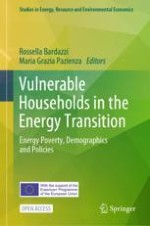This open access book explores the energy transition / energy poverty nexus in the European Union, including the implications of the transition and related policies for the household sector. Written by experts on energy economics, energy studies and related fields, it examines the impacts and costs of the energy transition (including those caused by carbon pricing) for the economy and for families in particular. Providing case studies on Germany, France, Italy, Spain and Greece, the contributing authors highlight current overlapping vulnerabilities for households, show the effects of decarbonization policies on relative prices, and discuss strategies for reducing energy poverty while also decarbonizing. Moreover, they address household and consumer vulnerabilities in connection with societal transformations such as demographic changes and the aging populations of Europe and particularly Italy. Given its scope, the book will appeal to scholars and students of energy studies, energy economics and related fields, and to anyone interested in the benefits and costs of the ongoing energy transition.
